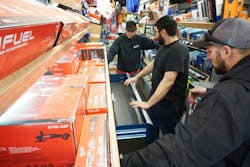You just found a $10,000 toolbox on Facebook Marketplace for $2,000! Too good to be true? Most likely the toolbox has a lien on it from the tool company that financed the purchase. You'd be buying a toolbox from someone who doesn't legally own it. A couple of months prior to writing this article, I responded to a couple of, “too good to be true” toolboxes for sale on Marketplace. I contacted the sellers telling them I was very interested. I also asked if they owed a tool distributor or tool company money on the toolbox. I wasn't surprised when I didn't receive any correspondence back from either seller.
In-house financing with flags
All four of the dominant flags (Snap-on, Cornwell, Mac Tools, and Matco Tools) provide in-house financing for larger purchases. It's common for customers to have two accounts with their tool distributor. In addition to the “handshake” or time payment account most common on tool trucks, many also have an account with the tool company's finance department.
Toolboxes and carts to check out:
- Tony Squindo "It's Alive!!" Premium Full Drawer Service Carts, No. SUN8057XTLGALIVE
- 35" x 21" Rolling Tool Cart Max Grundy Series #1, No. MSC4FDMG325
- 182-pc Quick Service Toolset + Next S4 Cart
- 7-Drawer Drop-Top Cart with 49" Vertical Power Drawer
- 56" and 84" Platinum Plus Tool Storage
- 44" RS PRO 9-Drawer Power Cart, No. WH06044090
- 6-Drawer and 4-Drawer Tool Carts, Nos. SK03201 and SK03202
- Speed Demon EPIQ 68" Roll Cab, No. KETP682A3WHZ
These company-financed contracts allow for larger purchases with a longer term to allow for more affordable payments. The trade-off for lower payments means that interest charges are included with the weekly payment. These contracts also include some type of security agreement. That means there's a lien on the tools and equipment until the entire contract balance is paid in full. Should you opt to add another purchase at a later date, the entire balance is attached. It's what's known as “crossed collateral.” Simply put, if you bought a toolbox on contract and later added more tools, the entire balance is secured by each item ever purchased on the tool company's finance program. The only way to satisfy the lien is to pay off the entire balance including the original purchase.
Most people understand if you financed an automobile, you'd have to payoff the loan before the vehicle could be sold to another party. Say you purchased a pickup and a camp trailer on the same contract. You wouldn't be able to sell the trailer separately as it's part of the original contract. Same had you bought a toolbox and a cart. You can't sell the cart until the entire balance is paid.
Closing the lien
Is it paid for? It's the dealer's responsibility to make sure any items to be considered for trade-in do not have a lien against them. Arguments like “But I bought that toolbox years ago,” or “I must have paid for that ages ago,” hold no weight. Unless you've paid the contract to a zero balance, all items still have a lien against them.
You'll ask a number of questions to a prospective toolbox customer. Color, size, drawer configuration, and accessories are the standard questions. But the most important question? Do you owe money on the box? This is also the point where you need to tread lightly. We as an industry haven't done a very good job explaining to the end user the ramifications of secured loans and cross collateral. Again, the customer may honestly feel, based on the number of years since the original toolbox purchase, that they had more than paid for the toolbox. However, if the original contract has never been paid off, then all the other items purchased in the following years are still secured by the tool company.
Related content
Do old liens prevent future sales?
Don't let the fact that your customer still owes on the toolbox stop you from pursuing the sale of a new box. Check and see how much the customer still owes. In many cases, it's still possible to salvage the sale. Paying off the customer's debt with the competition and rolling that balance onto the contract with the sale of the new toolbox is a great way to complete the sale. It might even save the customer money on their weekly payment. In some cases, the customer could be paying a higher dollar amount from the original sale. I've seen a number of incidents where the new terms result in a lower payment.
The best way to determine exactly what the customer owes is to have them call the competing tool company while you're standing next to him or her. If the numbers are acceptable to you and your customer, pay off the balance with your business credit card while the customer service rep is still on the phone. Make sure you record the transaction number, the name of the customer service rep, and any other pertinent information just in case there are any issues. Make sure your customer also has the information just in case the competing dealer has any issues with the transaction. If the customer wants to think about the deal before making the decision, be sure to have the customer find out how long the payoff balance is good. Payoff balances are usually good for a set time period.
Back when I first started on a tool truck, I'd bring a business check with all the transaction information in the memo field. I don't know of a single successful distributor who's not extremely competitive. There's just something about paying off a customer's debt with a competitor that makes the toolbox sale a little sweeter!
Whatever you do, never ignore the fact the trade-in you're about to take may have a lien on it. In a best-case scenario, you'll have to return the trade-in box and reverse the sale with your customer. I can tell you with 100 percent certainty that some tool companies will demand the collateral be returned. They can bill you for the amount owed on the contract or simply come and personally take possession of their toolbox, equipment, and/or tools. Security agreements are legal and enforceable. Take the needed steps to ensure you've picked up a trade-in that doesn't have a lien against it. It can be a very embarrassing situation for both you and your customer if you don't.
About the Author

Brian Fahlgren
Brian Fahlgren started in the tool business in 1998. Fahlgren has been an employee dealer, franchised dealer, and district manager for two different flags. In 2018, he returned to the driver's seat of his own tool truck. Providing premium service and his continuous "close to perfect" attitude, he achieved his goal of being a Top 10 dealer for Cornwell Quality Tools. He and his wife of over 44 years recently retired, moving from Oregon to the endless summers of Beverly Hills, Florida.

